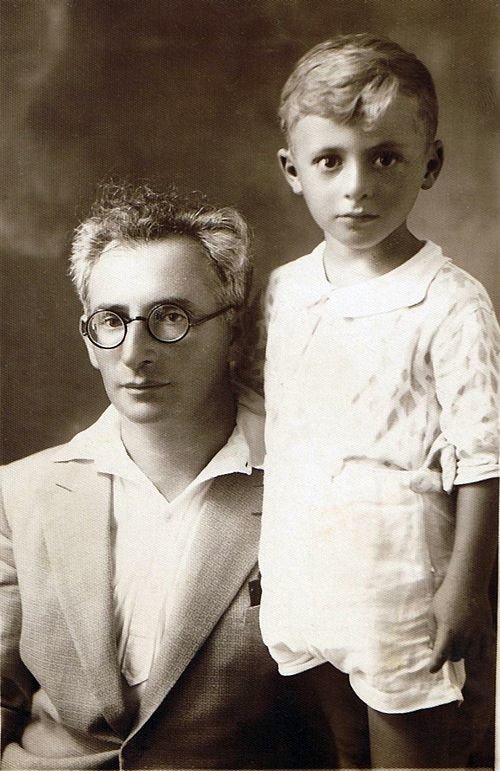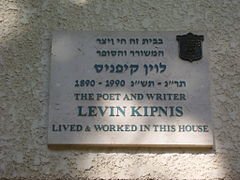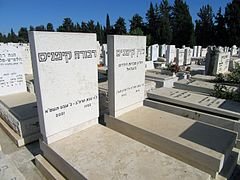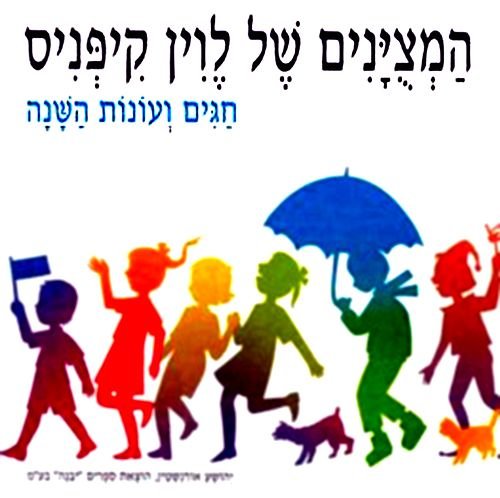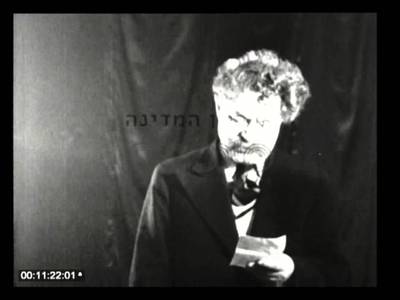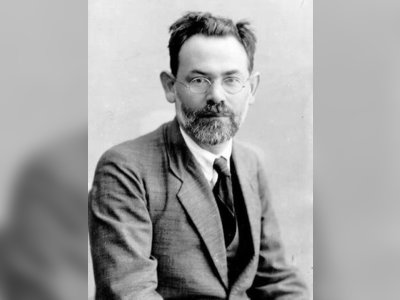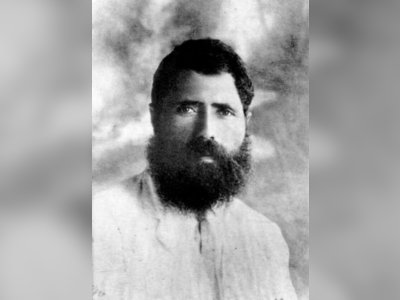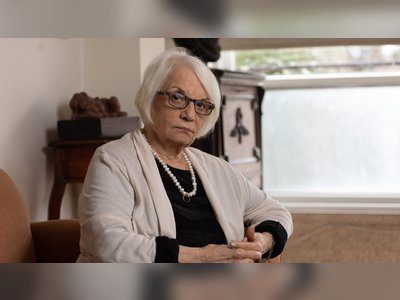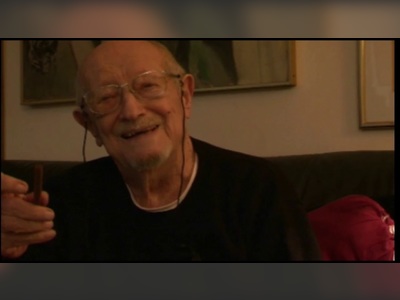מורשת גדולי האומה
בזכותם קיים
beta
Levin Kipnis
Levin Kipnis (August 1, 1890 – June 20, 1990) was an Israeli children's author and poet who wrote primarily in Hebrew and Yiddish. He was awarded the Israel Prize for Children's Literature in 1978.
Biography
Levin Kipnis was born in Ushomir, within the Jewish community of the Russian Empire (now in Ukraine). He was born to Pesach Kipnis and Rachel (née Braverman) in a family of ten children. While his official identification documents and gravestone indicate his birth year as 1894, there is evidence in his handwritten notes that suggest he was born on August 1, 1890. This discrepancy is seen in a letter to his school, "Bezalel," where he mentioned his age along with the date, as well as in an inscription to his nephew where he did the same. For unknown reasons, he later subtracted four years from his age.
His father, a community leader, sent Levin to study in a "cheder," a traditional Jewish school, which he did not enjoy due to the strict educational system. From a young age, Kipnis explored his artistic talents in painting and woodcutting. Recognizing his potential, his father encouraged him to learn calligraphy, which he did by writing mezuzahs (sacred Jewish scrolls) for his family's economic support.
Levin Kipnis began his writing career with a newspaper he founded around the time of his bar mitzvah, called "Perakhei Levi." His first published work in an official newspaper was a poem titled "The Sick Child," which appeared in the children's newspaper "Haperahim" in 1910.
In his hometown, Kipnis established a "Cheder Metukan" (renovated cheder), set up a Hebrew library, and directed children's plays he wrote himself. In 1913, he made aliyah (immigrated to the Land of Israel) and enrolled in the Bezalel Academy of Arts and Design to further his art education. The shortage of educational materials for young children in the early years of the Land of Israel prompted him to write poems tailored to the needs of Israeli children. His first Hebrew children's book was "Hanukkah: Children's Books of the Histadrut" (1920).
During World War I, Kipnis was involved in establishing the "Little Library for Children" in Jaffa, where his early stories for children were published. Simultaneously, he worked in agricultural jobs imposed by the Ottoman authorities.
After the war, Kipnis taught Yemenite Jewish children in Hadera. He then returned to Jerusalem upon the invitation of Bezalel to write and edit educational materials for kindergarten teachers. He produced collections of stories and songs for kindergarten teachers and edited the first Hebrew journal for kindergarten teachers in the Land of Israel.
In 1921, he took on the management of an orphanage in Safed, and in 1922, he traveled to Berlin, Germany, to study art. During his time in Berlin, he published three books in German. In 1923, he returned to Israel, where he taught at the Levinsky Teachers' Seminary in Tel Aviv and wrote educational materials for teachers.
In 1924, he married Miriam Lubman, the daughter of Zeev Jabotinsky's brother, Dov Hoz, in Tel Aviv. They had two children, Shai and Nitza. The family lived in Tel Aviv for about a decade before building a house in Rishon LeZion. After Miriam's death in 1935 from pneumonia, Kipnis moved back to Tel Aviv. Later, he married Deborah Kresnov, a kindergarten teacher, and they had two children, Tal and Netta.
In 1928, Kipnis established a children's theater in Tel Aviv, which he managed for 25 years, producing numerous plays and stories. He continued to write extensively while managing the theater. He also published newspapers, periodicals, and study materials for children.
In 1956, Kipnis retired from teaching and devoted himself entirely to writing and publishing. He was a prolific writer for an astonishing 80 continuous years, starting from 1910 and continuing until 1990.
Among the awards he received are the Yatziv Prize (1962), the Lamdan Prize (1976), the Israel Prize (1978), and the Hans Christian Andersen Award (1988). His works have been translated into English, French, German, Russian, Arabic, and Yiddish.
Levin Kipnis is buried at the Kiryat Shaul Cemetery. His wife, Deborah, passed away in 2001 and is buried beside him.
Legacy
In 1982, Levin Kipnis's family established the Levin Kipnis Center for Education in Tel Aviv University, dedicated to children's literature and serving researchers, students, teachers, and literature enthusiasts. It provides access to archival collections and research materials.
In 2018, the Levin Kipnis Center acquired a collection of 200 books donated by Eliyahu Cohen in the late 1990s, adding to the center's resources.
Several streets in Be'er Sheva and Tel Aviv are named in honor of Levin Kipnis.
In June 2013, composers Moshe Zorman and playwright Yoni Lahav created the musical "King of Children," based on Levin Kipnis's life, from the dark room to the Israel Prize.
Levin Kipnis's literary legacy consists of approximately 800 stories, 600 poems, and around a hundred children's books. His writing is characterized by its light and joyful style, devoid of pathos but rich in depth and aesthetics. He often conveyed messages of helping others and volunteering, as seen in his famous stories "Eliezer and the Carrot," about a group effort to pull a massive carrot from the ground, and "King Narcissus," about a narcissus who agreed to lend itself to heal the King of Frogs, receiving a crown in return. Other notable stories include "The Great Spoon of Abba," "The Golden Nut" (a Passover story about two children and a magical nut), "The Three Butterflies," and "The Menorah and the Olive Branch" (an allegory for the state emblem of Israel).
Kipnis also wrote numerous songs for children, especially for Jewish holidays, due to the scarcity of appropriate songs for ceremonies and activities in schools and kindergartens at that time. Some of his well-known songs include "Shanah Tovah" (New Year's), "Guests for the Holiday," "Levivot" (Latkes), "Ner Li" (I Have a Candle), "Sivivon Sov Sov Sov" (Dreidel, Spin Spin Spin), "Shim'u Shemen" (Bring Oil), "I Am Purim," "Purim Holiday," "Hag Purim," "Hag Sameach," and many more. "Hagada" is the only song for which Kipnis composed both the lyrics and music.
Levin Kipnis also translated works from other languages into Hebrew, including works by Leo Tolstoy, Carlo Collodi, Romain Rolland, Maxim Gorky, Khalil Gibran, and Victor Hugo.
Levin Kipnis was born in Ushomir, within the Jewish community of the Russian Empire (now in Ukraine). He was born to Pesach Kipnis and Rachel (née Braverman) in a family of ten children. While his official identification documents and gravestone indicate his birth year as 1894, there is evidence in his handwritten notes that suggest he was born on August 1, 1890. This discrepancy is seen in a letter to his school, "Bezalel," where he mentioned his age along with the date, as well as in an inscription to his nephew where he did the same. For unknown reasons, he later subtracted four years from his age.
His father, a community leader, sent Levin to study in a "cheder," a traditional Jewish school, which he did not enjoy due to the strict educational system. From a young age, Kipnis explored his artistic talents in painting and woodcutting. Recognizing his potential, his father encouraged him to learn calligraphy, which he did by writing mezuzahs (sacred Jewish scrolls) for his family's economic support.
Levin Kipnis began his writing career with a newspaper he founded around the time of his bar mitzvah, called "Perakhei Levi." His first published work in an official newspaper was a poem titled "The Sick Child," which appeared in the children's newspaper "Haperahim" in 1910.
In his hometown, Kipnis established a "Cheder Metukan" (renovated cheder), set up a Hebrew library, and directed children's plays he wrote himself. In 1913, he made aliyah (immigrated to the Land of Israel) and enrolled in the Bezalel Academy of Arts and Design to further his art education. The shortage of educational materials for young children in the early years of the Land of Israel prompted him to write poems tailored to the needs of Israeli children. His first Hebrew children's book was "Hanukkah: Children's Books of the Histadrut" (1920).
During World War I, Kipnis was involved in establishing the "Little Library for Children" in Jaffa, where his early stories for children were published. Simultaneously, he worked in agricultural jobs imposed by the Ottoman authorities.
After the war, Kipnis taught Yemenite Jewish children in Hadera. He then returned to Jerusalem upon the invitation of Bezalel to write and edit educational materials for kindergarten teachers. He produced collections of stories and songs for kindergarten teachers and edited the first Hebrew journal for kindergarten teachers in the Land of Israel.
In 1921, he took on the management of an orphanage in Safed, and in 1922, he traveled to Berlin, Germany, to study art. During his time in Berlin, he published three books in German. In 1923, he returned to Israel, where he taught at the Levinsky Teachers' Seminary in Tel Aviv and wrote educational materials for teachers.
In 1924, he married Miriam Lubman, the daughter of Zeev Jabotinsky's brother, Dov Hoz, in Tel Aviv. They had two children, Shai and Nitza. The family lived in Tel Aviv for about a decade before building a house in Rishon LeZion. After Miriam's death in 1935 from pneumonia, Kipnis moved back to Tel Aviv. Later, he married Deborah Kresnov, a kindergarten teacher, and they had two children, Tal and Netta.
In 1928, Kipnis established a children's theater in Tel Aviv, which he managed for 25 years, producing numerous plays and stories. He continued to write extensively while managing the theater. He also published newspapers, periodicals, and study materials for children.
In 1956, Kipnis retired from teaching and devoted himself entirely to writing and publishing. He was a prolific writer for an astonishing 80 continuous years, starting from 1910 and continuing until 1990.
Among the awards he received are the Yatziv Prize (1962), the Lamdan Prize (1976), the Israel Prize (1978), and the Hans Christian Andersen Award (1988). His works have been translated into English, French, German, Russian, Arabic, and Yiddish.
Levin Kipnis is buried at the Kiryat Shaul Cemetery. His wife, Deborah, passed away in 2001 and is buried beside him.
Legacy
In 1982, Levin Kipnis's family established the Levin Kipnis Center for Education in Tel Aviv University, dedicated to children's literature and serving researchers, students, teachers, and literature enthusiasts. It provides access to archival collections and research materials.
In 2018, the Levin Kipnis Center acquired a collection of 200 books donated by Eliyahu Cohen in the late 1990s, adding to the center's resources.
Several streets in Be'er Sheva and Tel Aviv are named in honor of Levin Kipnis.
In June 2013, composers Moshe Zorman and playwright Yoni Lahav created the musical "King of Children," based on Levin Kipnis's life, from the dark room to the Israel Prize.
Levin Kipnis's literary legacy consists of approximately 800 stories, 600 poems, and around a hundred children's books. His writing is characterized by its light and joyful style, devoid of pathos but rich in depth and aesthetics. He often conveyed messages of helping others and volunteering, as seen in his famous stories "Eliezer and the Carrot," about a group effort to pull a massive carrot from the ground, and "King Narcissus," about a narcissus who agreed to lend itself to heal the King of Frogs, receiving a crown in return. Other notable stories include "The Great Spoon of Abba," "The Golden Nut" (a Passover story about two children and a magical nut), "The Three Butterflies," and "The Menorah and the Olive Branch" (an allegory for the state emblem of Israel).
Kipnis also wrote numerous songs for children, especially for Jewish holidays, due to the scarcity of appropriate songs for ceremonies and activities in schools and kindergartens at that time. Some of his well-known songs include "Shanah Tovah" (New Year's), "Guests for the Holiday," "Levivot" (Latkes), "Ner Li" (I Have a Candle), "Sivivon Sov Sov Sov" (Dreidel, Spin Spin Spin), "Shim'u Shemen" (Bring Oil), "I Am Purim," "Purim Holiday," "Hag Purim," "Hag Sameach," and many more. "Hagada" is the only song for which Kipnis composed both the lyrics and music.
Levin Kipnis also translated works from other languages into Hebrew, including works by Leo Tolstoy, Carlo Collodi, Romain Rolland, Maxim Gorky, Khalil Gibran, and Victor Hugo.
- לוין קיפניסhe.wikipedia.org
